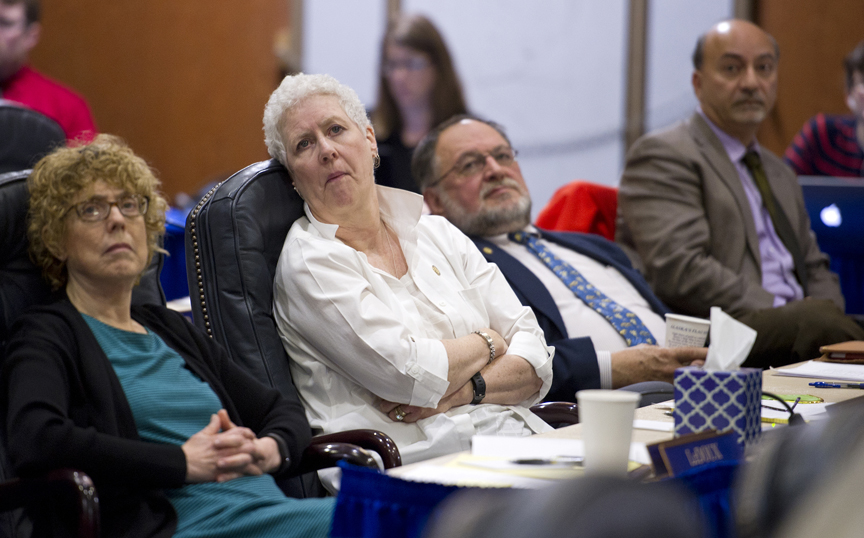Members of the Alaska House Finance Committee showed a notable lack of enthusiasm Tuesday as they heard details of Gov. Bill Walker’s omnibus tax bill for the first time.
House Bill 4001, nicknamed “tax-i-bus” by Rep. Scott Kawasaki, D-Fairbanks, incorporates seven different tax measures previously offered by Walker during the Legislature’s regular session.
If the bill were to pass the House and Senate, then be signed into law, state taxes on gasoline, tobacco, alcohol, fishing, and mining would rise. Alaska would have an income tax for the first time since the 1980s.
“Combined, this revenue package would raise about $350 million per year by (fiscal year 2019) and would be a substantial portion of closing the fiscal gap,” said Revenue Commissioner Randall Hoffbeck.
Alaska faces a nearly $4 billion difference between revenue and expenses, and both Hoffbeck and tax division chief Ken Alper told lawmakers that HB 4001 is part of Walker’s plan to eliminate that gap.
If the governor is serious, lawmakers asked, why pile everything into a single measure?
“When you have a bunch of bills that people don’t love and you put them together, you get fewer votes,” said Rep. Les Gara, D-Anchorage. “You’ve built a bill that’s almost guaranteed to fail.”
Hoffbeck replied that the governor tried to pass the taxes individually during the regular session, but since none of the bills passed, this measure could hardly do worse than those did.
He added that the administration was told by lawmakers that until the tax measures reached one of the Legislature’s two finance committees, they wouldn’t be discussed in detail.
The omnibus tax bill, directed promptly to the House Finance Committee, will at least be heard. “It’s easier to see all of the pieces in one place at one time,” he said.
Gara pressed further, asking whether the governor’s bill is truly serious or a way to simply give legislators a reason to ignore them in favor of things that have support ─ oil and gas subsidy reform, using the earnings of the Alaska Permanent Fund to pay for state operations, and the state’s annual operating and capital construction budgets.
“These are the bills the governor feels are needed,” Hoffbeck said. “The idea is that they all pass.”
Brinksmanship in the House
In a floor session Tuesday morning, the House Democratic minority failed in a bid to direct debate on reducing the state subsidy of oil and gas drilling.
Up for discussion was House Concurrent Resolution 401, a measure that allows the Legislature to resume where it left off on nine of the 11 bills on the special session agenda.
Normally, a bill dies when the regular session ends. Any work in the special session must start from scratch. HCR 401 allows the House and Senate to bypass that rule.
The minority suggested removing House Bill 247 ─ which contains reforms to oil and gas subsidies ─ from the resolution. That would have allowed Walker to introduce a new bill, one possibly more in line with the minority’s preference.
An amendment along those lines failed, however, and rather than kill the entire resolution and force lawmakers to start from scratch on everything ─ including the budget ─ they went along with the unamended resolution. It was subsequently passed by the Senate as well.
House Minority Leader Chris Tuck, D-Anchorage, said after the House vote that members of his caucus wanted a new version of HB 247, but they weren’t willing to start over on everything else.
As a result, a conference committee will now take up work on the critical issue of oil and gas tax subsidies. The House and Senate have passed different versions of HB 247, and it will be the conference committee’s task to come up with a compromise.
The committee consists of three members from the House (Reps. David Talerico, Kurt Olson and Geran Tarr) and three from the Senate (Sens. Cathy Giessel, Peter Micciche and John Coghill).
While the minority didn’t get to direct the agenda, it may still get to direct the outcome. Minority votes are necessary to spend from the Constitutional Budget Reserve, which has been seen as necessary to fund the budget this year.
Is cutting oil and gas subsidies is still a prerequisite for a vote on the budget?
“Yes, because that is a budget item,” Tuck said. “It is the third-largest item of our budget, and I just simply can’t ask people to pull money out of their pockets to give to the oil industry.”
• Contact reporter James Brooks at james.k.brooks@juneauempire.com.
Related stories:
Special session begins — slowly
Legislature quits without finishing work, gov calls special session
Double overtime: As 121st day winds down, Legislature remains deadlocked

